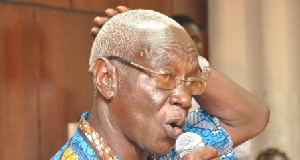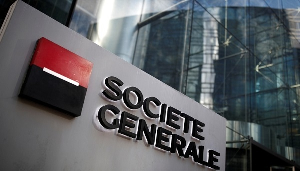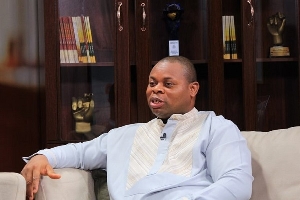- Home - News
- TWI News | TV
- Polls
- Year In Review
- News Archive
- Crime & Punishment
- Politics
- Regional
- Editorial
- Health
- Ghanaians Abroad
- Tabloid
- Africa
- Religion
- Election 2020
- Coronavirus
- News Videos | TV
- Photo Archives
- News Headlines
- Press Release
General News of Wednesday, 17 September 2014
Source: starrfmonline.com
IEA suggests EC scraps 'strong room'
Policy think tank, Institute of Economic Affairs (IEA-Ghana) is suggesting that Ghana’s Electoral Commission abolishes its Strong Room – where votes are collated in national elections.
The Room, over the years, has served as the operations centre of the Commission for collation and certification of election results. Party gurus and their representatives gather in that room to police the vote tabulation process.
However, the IEA has said in a statement that the Strong Room “is usually a very tensed and uncomfortable room”, thus its suggestion for it to be scrapped.
In its report released in Accra Tuesday as part of the think tank’s Electoral Reform Project, Dr. Ransford Gyampo, Research Fellow of the Governance Unit noted that: “The idea of a ‘strong room’ with very huge security presence conjures negative and derogatory images that undermine transparency and electoral peace”.
According to Dr. Gyampo, “some people perceive the ‘strong room’ as a place where election results from the regions are cooked or manipulated in favour of a political party”.
In the view of the IEA, “this derogatory perception undermines the credibility of the Election Management Body”.
Dr. Gyampo argued that democracy and perception of opacity cannot be bedfellows and that, it is in the EC’s own interest to abolish its strong room to shield itself from unnecessary public attacks and ensure increased transparency in the vote collation and authentication process.
In place of a strong room, the IEA is proposing the establishment of a National Collation Centre, which would be open and accessible to as many members of the political parties, the media, Civil Society Organisations and Election Observers as possible, but under controlled security in order to enhance the transparency of the national collation exercise”.
According to the IEA Research Fellow, a bigger venue that can accommodate about five hundred people is what is being recommended. Again, “it should be possible for the work and activities being undertaken at the proposed National Collation Centre to be viewed live on the national television by Ghanaians.”
According to Dr. Gyampo, “the IEA believes that the conception of a ‘strong room’ with its rather derogatory connotations, is completely out of place in the discourse on transparent elections”.
He therefore called on the EC to abolish its idea of ‘strong room’ to ensure increased transparency in the vote transmission, collation and authentication process.
This according to the IEA Research Fellow, can be achieved by establishing a National Collation Centre which would be open and accessible to as many members of the political parties, the media, Civil Society Organisations and Election Observers as possible, but under controlled security in order to enhance the transparency of the national collation exercise.
“The IEA call for a replacement of the strong room with the National Collation Centre will not in any way compromise the autonomy and independence of the Electoral Commission. It would rather boost the image of the EC as a more credible and transparent body as well as reduce the high perception of, and sometimes, incidence of electoral fraud that have characterise elections in Ghana”, Dr Gyampo noted. “Let the EC begin discussions on all proposals for electoral reform now.
Entertainment










